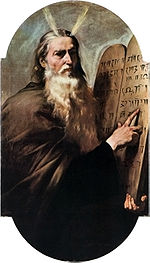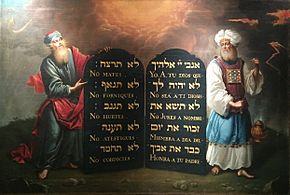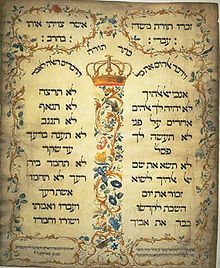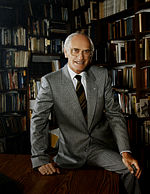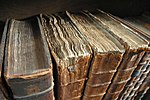Yitro
Deuteronomy 5:12–15 commands that one observe the Sabbath day, keep it holy, and not do any manner of work or cause anyone under one's control to work—so that one's subordinates might also rest—and remember that the Israelites were servants in the land of Egypt, and God brought them out with a mighty hand and by an outstretched arm.
The parashah has parallels or is discussed in these early nonrabbinic sources:[36] 1 Maccabees 2:27–38 told how in the 2nd century BCE, many followers of the pious Jewish priest Mattathias rebelled against the Seleucid king Antiochus IV Epiphanes.
[37] The parashah is discussed in these rabbinic sources from the era of the Mishnah and the Talmud:[38] The Tannaim debated what news Jethro heard in Exodus 18:1 that caused him to adopt the faith of Moses.
Rather, the Mekhilta of Rabbi Ishmael suggested that the similarity of Exodus 18:13 to Genesis 1:15 taught that whoever renders a true judgment is accounted as a coworker with God in the work of creation.
Interpreting God's command in Exodus 28:1, the Sages told that when Moses came down from Mount Sinai, he saw Aaron beating the Golden Calf into shape with a hammer.
"[44] The Mekhilta of Rabbi Ishmael deduced from the use of the singular form of the verb "encamped" (vayichan, וַיִּחַן) in Exodus 19:2 that all the Israelites agreed and were of one mind.
[45] Noting that Exodus 19:2 reports, "they encamped in the desert," the Mekhilta of Rabbi Ishmael taught that the Torah was given openly, in a public place, for if it had been given in the Land of Israel, the Israelites could say to the nations of the world that they had no portion in it.
"[47] Rabbi Eliezer interpreted the words, "And how I bore you on eagles' wings," in Exodus 19:4 to teach that God rapidly gathered all the Israelites and brought them to Rameses.
The Midrash noted that the Rabbis taught that documents of betrothal and marriage are written only with the consent of both parties, and the bridegroom pays the scribe's fee.
Moses noted that even though the Shechinah spoke with the Israelites on only one definite, appointed time (at Mount Sinai), God nonetheless instructed in Exodus 19:15, "Be ready against the third day: come not near a woman."
"[58] Rabbi Levi addressed the question that Deuteronomy 4:33 raises: "Did ever a people hear the voice of God speaking out of the midst of the fire, as you have heard, and live?"
[60] Rabbi Joshua ben Levi taught that when Moses ascended on high (as Exodus 19:20 reports), the ministering angels asked God what business one born of woman had among them.
Again, Exodus 20:8 says, "Remember the Sabbath day, to keep it holy," so Moses asked the angels whether they performed work from which they needed to rest.
[64] Rabbi Abbahu said in the name of Rabbi Joḥanan that when God gave the Torah, no bird twittered, no fowl flew, no ox lowed, none of the Ophanim stirred a wing, the Seraphim did not say (in the words of Isaiah 6:3) "Holy, Holy," the sea did not roar, the creatures did not speak, the whole world was hushed into breathless silence and the voice went forth in the words of Exodus 20:2 and Deuteronomy 5:6: "I am the Lord your God.
But those who embraced, kissed, washed, anointed, clothed, or swept or sprinkled the ground before an idol merely transgressed the negative commandment of Exodus 20:5 and were not executed.
The Gemara cited a Baraita that interpreted the words "the iniquities of their fathers shall they pine away with them" in Leviticus 26:39 to teach that God punishes children only when they follow their parents' sins.
[81] The Gemara reported that on the eve of the Sabbath before sunset, Rabbi Simeon ben Yochai and his son saw an old man running with two bundles of myrtle and asked him what they were for.
[85] The Tanna Devei Eliyahu taught that if you live by the commandment establishing the Sabbath (in Exodus 20:8 and Deuteronomy 5:12), then (in the words of Isaiah 62:8) "The Lord has sworn by His right hand, and by the arm of His strength: 'Surely I will no more give your corn to be food for your enemies."
[96] Interpreting the consequences of murder (prohibited in Exodus 20:13 and Deuteronomy 5:17), the Mishnah taught that God created the first human (Adam) alone to teach that Scripture imputes guilt to one who destroys a single soul of Israel as though that person had destroyed a complete world, and Scripture ascribes merit to one who preserves a single soul of Israel as though that person had preserved a complete world.
[97] The Tanna Devei Eliyahu taught that if you live by the commandment prohibiting murder (in Exodus 20:13 and Deuteronomy 5:17), then (in the words of Leviticus 26:6) "the sword shall not go through your land."
[101] Rav Aha of Difti said to Ravina that one can transgress the commandment not to covet in Exodus 20:14 and Deuteronomy 5:18 even in connection with something for which one is prepared to pay.
[102] The Mekhilta of Rabbi Ishmael asked whether the commandment not to covet in Exodus 20:14 applied so far as to prohibit merely expressing one's desire for one's neighbor's things in words.
[108] The Tosefta reported that Rabban Joḥanan ben Zakkai said that Deuteronomy 27:5 singled out iron, of all metals, to be invalid for use in building the altar because one can make a sword from it.
Thus Bar Kappara taught that the "ladder" in Jacob's dream of Genesis 28:12 symbolizes the stairway leading up to the altar in the Temple in Jerusalem.
"[58] The parashah is discussed in these medieval Jewish sources:[113] Interpreting Exodus 18:21 together with Deuteronomy 1:13, Maimonides taught that judges must be on the highest level of righteousness.
Maimonides read Exodus 18:21, "men of power," to refer to people who are mighty in their observance of the commandments, who are very demanding of themselves, and who overcome their evil inclination until they possess no unfavorable qualities, no trace of an unpleasant reputation, even during their early adulthood, they were spoken of highly.
[123] Gunther Plaut observed that in Deuteronomy 1:13, the people—not Moses, as recorded in Exodus 18:21 and 24–25—chose the officials who would share the tasks of leadership and dispute resolution.
[132] Everett Fox noted that "glory" (כְּבוֹד, kevod) and "stubbornness" (כָּבֵד לֵב, kaved lev) are leading words throughout the book of Exodus that give it a sense of unity.
The Court noted that some of the Commandments apply to arguably secular matters, such those at Exodus 20:11–16 and Deuteronomy 5:15–20, on honoring one's parents, murder, adultery, stealing, false witness, and covetousness.
[146] Reuven Hammer noted that Mishnah Tamid 5:1[147] recorded what was in effect the first siddur, as a part of which priests daily recited the Ten Commandments.












